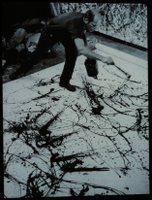
Mark this date on your calendar and keep it sacred forevermore. It is a first in the history of Suldog-O-Rama. Today, I actually know a little bit concerning what I'm going to spout off about.
(The above notwithstanding, I don't know everything about it. And my mind is as disorganized as ever, so I'm bound to forget something interesting and/or important. Feel free to ask questions as we go along. I'll either admit my ignorance or answer to the best of my ability - or trot out some convincing bull.)
(And there are less graphics here than I'd like because I offer no pretentions of knowing a damned thing about why Blogger isn't letting me publish more quickly today. Maybe tomorrow I'll be smarter, but don't hold your breath.)
*************************************************************
A reader asked me for some pointers on voice-over work. He feels that his wife has a wonderful voice and he has been urging her to get into a situation wherein she might utilize her God-given talent. I'm going to try to provide some real and honest advice.
My first bit of advice? If you pronounced the second word in the title of this piece as PRY-mer, you might be better suited for work as a painter.
(I'll try to keep the rest of the advice relatively sarcasm-free.)
BEFORE THE DEMO
"I want to pay you squillions of dollars for reading something. Follow me."
Unless someone walks up to you and says that, you're going to need some way of letting people know that you have a voice and are willing to sell it. You will need a demo.
Your demo (maybe a cassette tape, maybe a CD, maybe a website with audio) will be, at least in most instances before you're established, the main factor in your being hired or not. You may have a swell personality and a lovely smile, but nobody gives a damn unless you first prove that you can talk.
Before you record your demo, though, here are the most important things to consider.
1 - Do You Have It?
That is, is your voice salable? Do you have something that people will want to pay money for? Is anybody really going to hire you?
Notice that I did not say, "Can you read a paragraph without stumbling?" I know plenty of voice-over professionals - people who get paid a lot more than I do, and whom I have worked with as a producer - who can't get through four sentences without a mistake. If your overall delivery is good enough - warm, friendly, believable - it will sometimes be enough to trump poor technique. Not if I'm the one doing the hiring, but it happens more often than you might think.
 Voice-over quality is generally not objectively measured. This discipline is part of the entertainment business and, as such, it is almost wholly subjective. For example, take someone like Barbara Walters. She has a very noticeable speech impediment, yet she is one of the most successful news people in the history of television. Likewise, there are voice-over professionals who lisp, who pop their plosives, who make "rain" sound like "wayne", and who can't say "suffering succotash" any better than Sylvester The Cat, but who still make better money than I'll ever see.
Voice-over quality is generally not objectively measured. This discipline is part of the entertainment business and, as such, it is almost wholly subjective. For example, take someone like Barbara Walters. She has a very noticeable speech impediment, yet she is one of the most successful news people in the history of television. Likewise, there are voice-over professionals who lisp, who pop their plosives, who make "rain" sound like "wayne", and who can't say "suffering succotash" any better than Sylvester The Cat, but who still make better money than I'll ever see.Am I sounding a tad bitter? I'll admit it - I am. I have nearly perfect diction, which I worked very hard to attain, but for whatever reason my voice is not generally warm and friendly. For the most part, advertisers want warm and friendly. So, if you've got that, you can have faults that would normally make an objective person think that you might not be suited for a career in reading.
I would say that about 25% of the voices I work with regularly have some sort of flaw in their pronunciation. However, that alone won't kill you. As I hope I've said often enough by now, if your delivery is good enough you might still be hired.
And, as I've also said, you might speak the King's English perfectly and never get a job. Even though your pronunciation is flawless, you might have a voice that grates. Of course, that hasn't stopped Fran Dreschler or Gilbert Gottfried.
What all professional voice-over talents have, and what you must also have, is something that separates you from the pack. You don't have to be unique, but you at least have to have something that can't be found easily. The more of "it" you have, the more likely you'll be hired.
Do you have a soothing deep baritone? A sexy, breathy alto? Do you have the ability to mimic (or, better yet, create) comic voices? Is there a natural smile in your voice? Or do you have the ability to inspire? Maybe you have the voice of doom - a basso profundo dripping with menace. Or you might have a particular accent that is pleasant to the ear. All of these are salable.
If, on the other hand, you have a thick Boston accent and you can't read words of more than two syllables without stopping to figure them out and you spit into the microphone, you might want to consider a different line of work.
 Or not. As I've said, and will say again, it's entirely subjective. I'd say you're better off starting with good classical tools on display, but Jackson Pollock sold one hell of a lot more paintings in his lifetime than Vincent Van Gogh did in his, so who knows? When you leave things up to the public, the classical definition of talent is not necessarily a consideration.
Or not. As I've said, and will say again, it's entirely subjective. I'd say you're better off starting with good classical tools on display, but Jackson Pollock sold one hell of a lot more paintings in his lifetime than Vincent Van Gogh did in his, so who knows? When you leave things up to the public, the classical definition of talent is not necessarily a consideration.My best advice is to get a couple of opinions before you invest a lot of time and/or money into recording a demo. In my own case, many people told me - for many years - that I had a great voice. I didn't really take them seriously until I found myself unemployed and in my 30's, with nothing to lose. Then I went to broadcasting school and here I am making the medium-sized bucks.
The important thing is that all of those opinions I received were wholly unsolicited.
If you ask your friends and relatives if you have a good voice, their opinions might or might not be totally honest. Only you know the source well enough to say if it's a good opinion or not. If many strangers, over a long period of time, tell you something? You can fairly much consider it true. So, try to get opinions from those without a vested interest in your happiness. If you get enough positive feedback, you can rely on it.
I cannot stress this enough, though. In the end, it is still subjective. One producer will love your voice while another won't be able to stomach it. That's just the way it is. And if you can't take random rejection, this business will kill you.
Have I said a whole bunch of nothing here? Are you still as undecided as you were before? Sorry, but I can't tell you if you have "it" without actually hearing you. And, even if I did hear you and considered you the second coming of James Earl Jones, somebody else is just as likely to be much happier if they never hear you again.
Subjective.
But make the decision, one way or the other. If you decide that you've got it, then...
2 - Do You Need To Polish It?
Do you need professional training to make it as a voice-over person? Must you go to broadcasting school, or at least take a few classes from professionals?
No.
However, don't misunderstand me. Any classes you take will probably not hurt your chances and may well enhance your abilities. In all probability, taking classes or attending school will at least boost your self-confidence. I would never have made it in any way if I hadn't gone to broadcasting school. I learned a few things that were good to know (mic technique, pronunciation, technical aspects of recording) but the biggest thing I gained was confidence in my natural abilities. The constant positive reinforcement I received from teachers and fellow students was worth more to me than the lessons.
You have to assess your own talents and liabilities, first, and then decide if you need outside help in polishing what you have and/or in getting rid of what you don't want.
Do you have good pronunciation? Do you have a speech impediment you'd like to minimize? How about a regional accent that will hinder your employment possibilities?
Do you know how to position yourself in front of a microphone to maximize what you have? How is your breath control? Can you speak long sentences - or perhaps paragraphs - without taking a breath? Can you pick up a magazine, a book, a script, and read it "cold" - that is, on first look - and almost never make a mistake? Do you have an ear for inflection, for investing a read with the correct emotion?
Have you ever heard your own voice?
That might seem like an odd thing to ask. You've heard your own voice for many years. But have you ever heard it as others hear it? Have you ever heard your recorded voice? Many people haven't and are shocked when they first hear themselves.
Mark this as a cardinal rule, then - listen to yourself before you consider anything to do with voice-over work. At the bare minimum, you shouldn't ever be sitting with a producer, listening to a playback, and saying, "Wow! That's ME?" It would be a dead giveaway that you'd never done this sort of thing before...
Seriously, you should know what you sound like. You won't be able to improve your technique appreciably until you do.
Aside from other considerations, broadcasting school (or a college specializing in media arts) can be expensive. Classes from an established voice-talent can also be expensive. If you think you have the tools you need already, you might want to skip those expenses.
Only you know, in your heart of hearts, if you believe in your abilities as they now stand. If you truly believe in yourself and your abilities, I'd give it a shot without going to school. If you find out you need something else, you can always go later. However...
3 - Do You Have Access To Professional Recording Facilities?
It will not do to send a professional recording engineer or producer a sub-standard, non-professional demo. You will be shot down in flames within seconds. So, do you have recording facilities good enough to turn out a professional-sounding product, or will you need to hire someone to do your recording for you?
Most broadcasting schools will have good facilities for students to use. Classes with a voice-over professional will often include a professionally-recorded tape as part of the class price. If you don't have access to good facilities, you may find that the money spent for school or classes is worth it to you just for the ability to cleanly record yourself.
I've had many demo tapes cross my desk. Some have literally been laughable. I once received a tape wherein the fellow did a reading of Green Eggs And Ham by Doctor Suess. The entire book. And that was the only thing on the tape. It was accompanied by snaps, crackles, hisses and pops being made by the crummy tape recorder he used. I could hear him turning the pages. He didn't have a bad voice, but he sure had a horrible demo.
My first demo wasn't a great one. I had learned enough in school to know that I had to have some variance in what I was presenting, and that I had to send out a decently-clean-sounding tape (no background noises), and there was some cleverness in the presentation, but beyond that I listen to it now and cringe. It took a producer with some heart, willing to look at what I might become rather than what I was, for me to get a job. Those folks are rare, so unless you're tremendously lucky, you'd better have a good tape.
And I'll leave off here for now. More tomorrow on actually putting together your demo.
Go to Part Two
2 comments:
Brilliant! I'm a guy who wanted to work in V/O, but after a few years in radio, woke to the conclusion that I didn't have the voice for it. Diction, yes. A real voice? Not so much.
I think your guide is spot on, and should be syndicated on other web-sites, blogs, Seinfeld, whatever.
Thank you, Stu. I hope the remainder is as good as you give me credit for :-)
Post a Comment